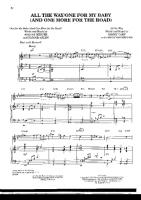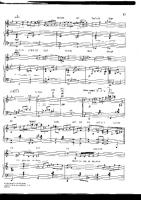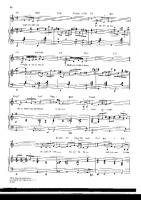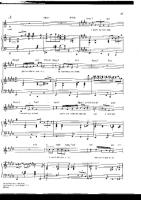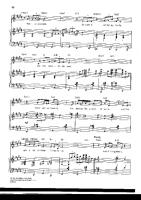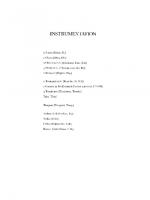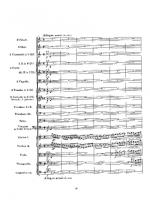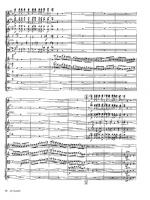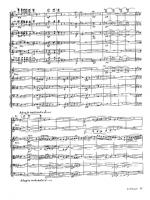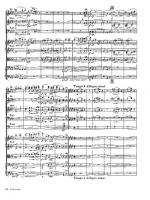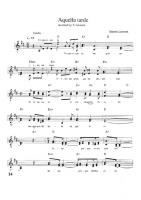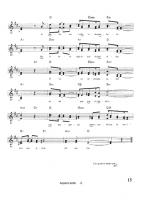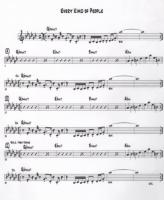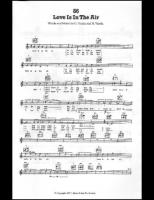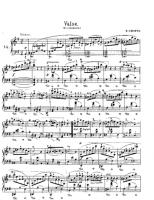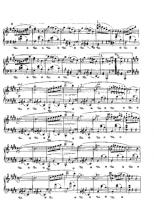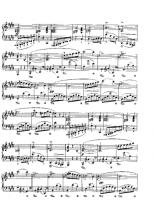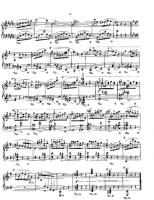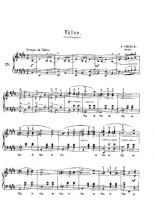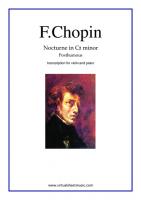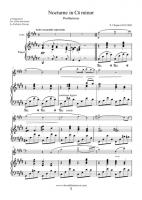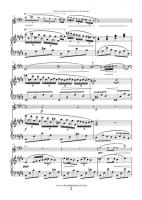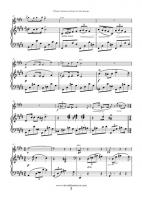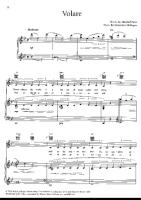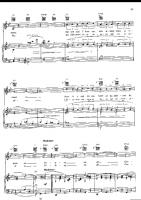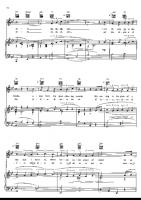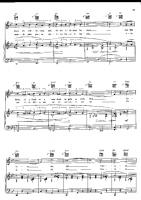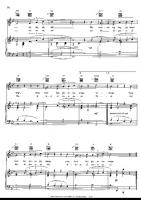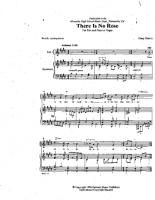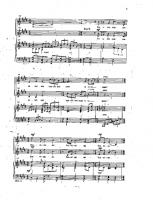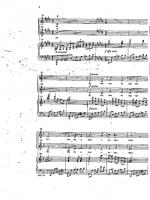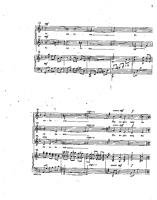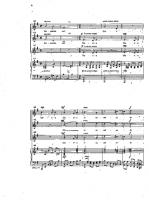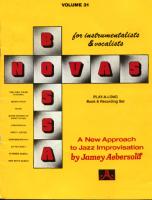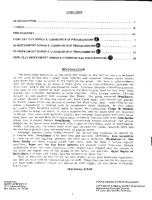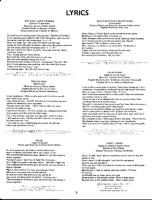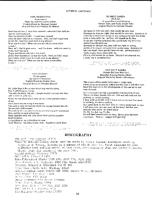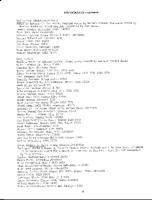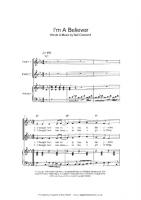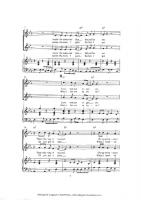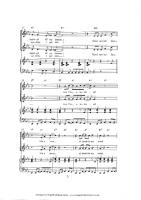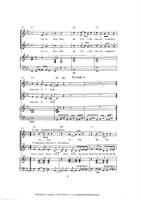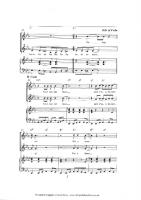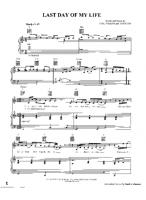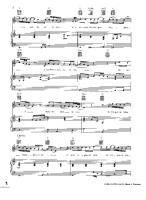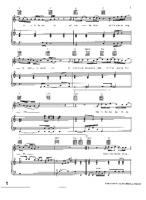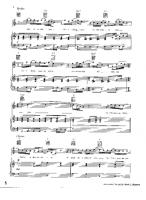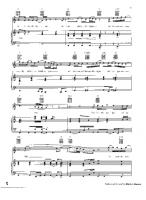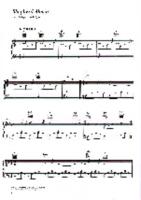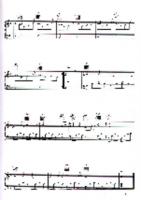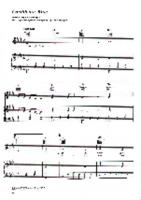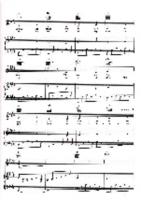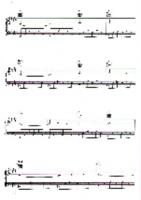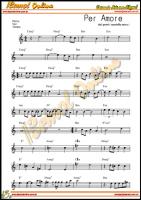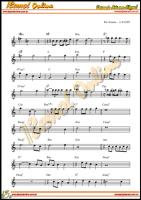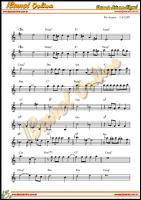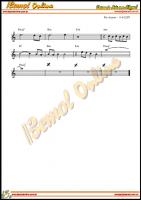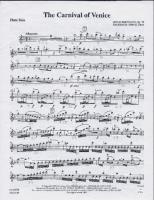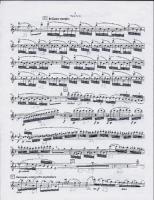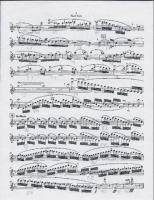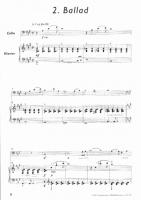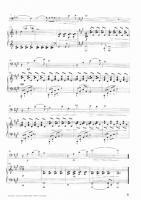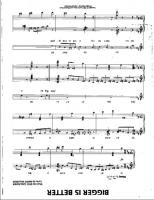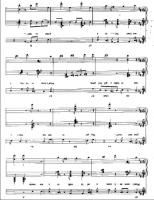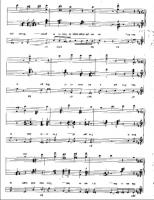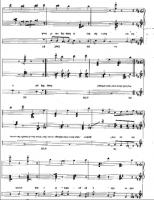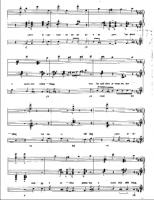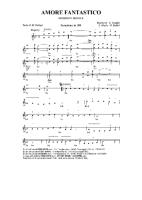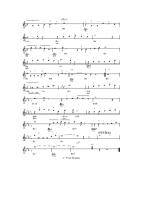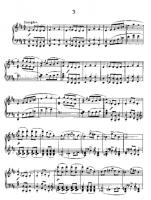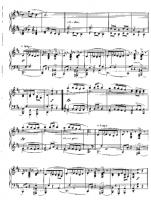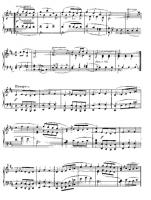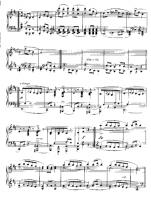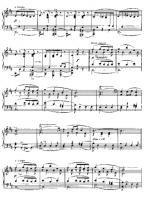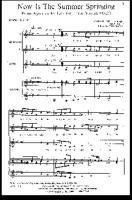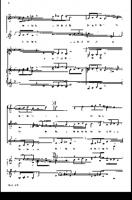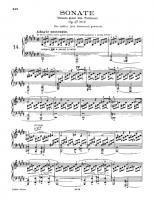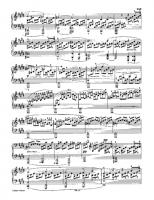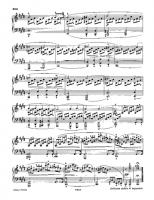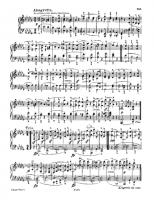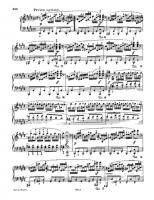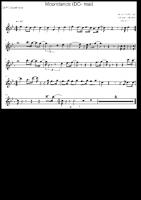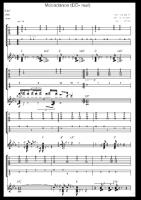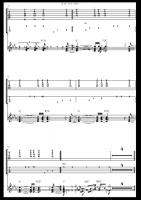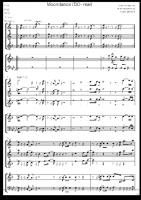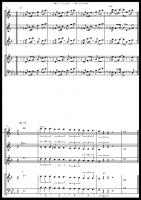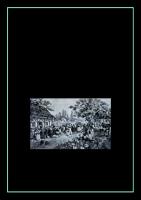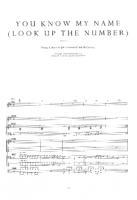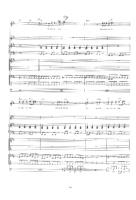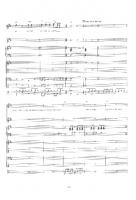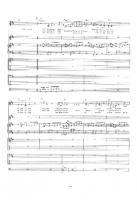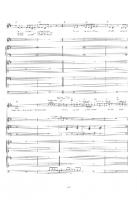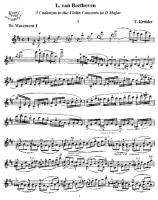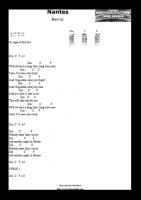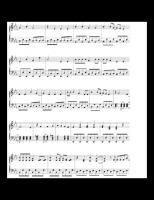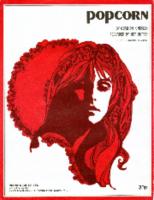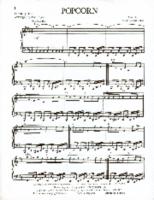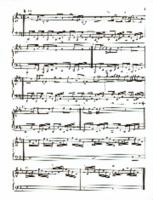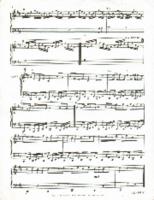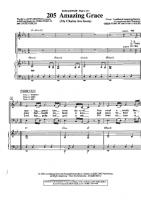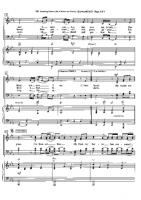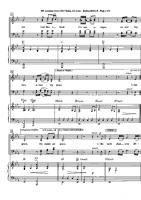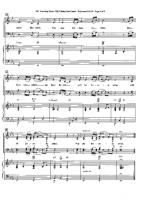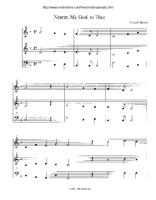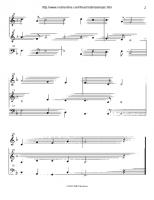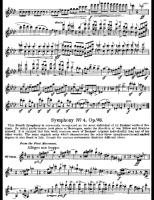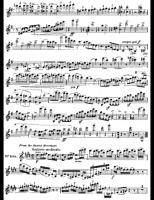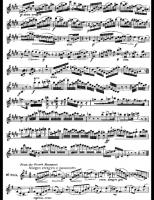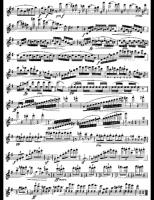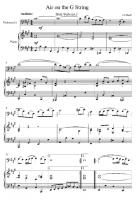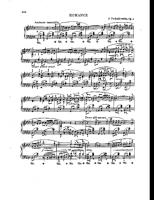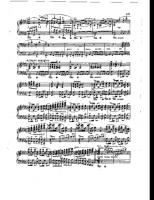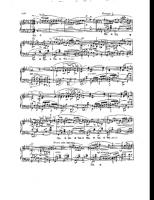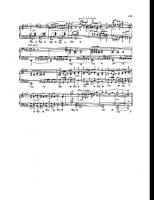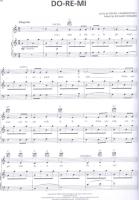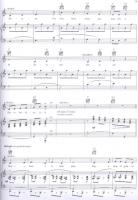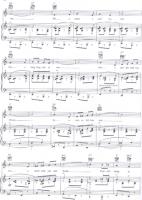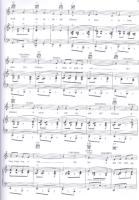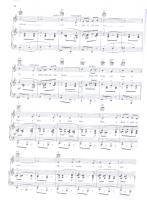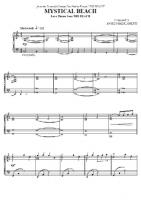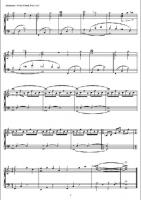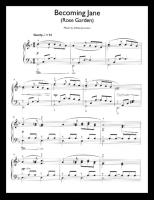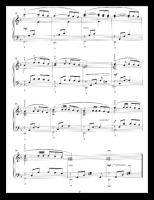Latest Sheets
Frank Sinatra
Francis Albert "Frank" Sinatra (December 12, 1915 â May 14, 1998) was an American singer and actor.
Beginning his musical career in the swing era with Harry James and Tommy Dorsey, Sinatra became a solo artist with great success in the early to mid-1940s, being the idol of the "bobby soxers". His professional career had stalled by the 1950s, but it was reborn in 1954 after he won the Academy Award for Best Supporting Actor.
He signed with Capitol Records and released several critically lauded albums (such as In the Wee Small Hours, Songs for Swingin' Lovers, Come Fly with Me, Only the Lonely and Nice 'n' Easy). Sinatra left Capitol to found his own record label, Reprise Records (finding success with albums such as Ring-A-Ding-Ding, Sinatra at the Sands and Francis Albert Sinatra & Antonio Carlos Jobim), toured internationally, and fraternized with the Rat Pack and President John F. Kennedy in the early 1960s. Sinatra turned 50 in 1965, recorded the retrospective September of My Years, starred in the Emmy-winning television special Frank Sinatra: A Man and His Music, and scored hits with "Strangers in the Night" and "My Way".
Sinatra attempted to weather the changing tastes in popular music, but with dwindling album sales and after appearing in several poorly received films, he retired in 1971. Coming out of retirement in 1973, he recorded several albums, scoring a hit with "(Theme From) New York, New York" in 1980, and toured both within the United States and internationally until a few years before his death in 1998.
Sinatra also forged a career as a dramatic actor, winning the Academy Award for Best Supporting Actor for his performance in From Here to Eternity, and he was nominated for the Academy Award for Best Actor for The Man with the Golden Arm. His also starred in such musicals as High Society, Pal Joey, Guys and Dolls and On the Town. Sinatra was honored with the Kennedy Center Honors in 1983 and awarded the Presidential Medal of Freedom by Ronald Reagan in 1985 and the Congressional Gold Medal in 1997. Sinatra was also the recipient of eleven Grammy Awards, including the Grammy Trustees Award, Grammy Legend Award and the Grammy Lifetime Achievement Award.
Beginning his musical career in the swing era with Harry James and Tommy Dorsey, Sinatra became a solo artist with great success in the early to mid-1940s, being the idol of the "bobby soxers". His professional career had stalled by the 1950s, but it was reborn in 1954 after he won the Academy Award for Best Supporting Actor.
He signed with Capitol Records and released several critically lauded albums (such as In the Wee Small Hours, Songs for Swingin' Lovers, Come Fly with Me, Only the Lonely and Nice 'n' Easy). Sinatra left Capitol to found his own record label, Reprise Records (finding success with albums such as Ring-A-Ding-Ding, Sinatra at the Sands and Francis Albert Sinatra & Antonio Carlos Jobim), toured internationally, and fraternized with the Rat Pack and President John F. Kennedy in the early 1960s. Sinatra turned 50 in 1965, recorded the retrospective September of My Years, starred in the Emmy-winning television special Frank Sinatra: A Man and His Music, and scored hits with "Strangers in the Night" and "My Way".
Sinatra attempted to weather the changing tastes in popular music, but with dwindling album sales and after appearing in several poorly received films, he retired in 1971. Coming out of retirement in 1973, he recorded several albums, scoring a hit with "(Theme From) New York, New York" in 1980, and toured both within the United States and internationally until a few years before his death in 1998.
Sinatra also forged a career as a dramatic actor, winning the Academy Award for Best Supporting Actor for his performance in From Here to Eternity, and he was nominated for the Academy Award for Best Actor for The Man with the Golden Arm. His also starred in such musicals as High Society, Pal Joey, Guys and Dolls and On the Town. Sinatra was honored with the Kennedy Center Honors in 1983 and awarded the Presidential Medal of Freedom by Ronald Reagan in 1985 and the Congressional Gold Medal in 1997. Sinatra was also the recipient of eleven Grammy Awards, including the Grammy Trustees Award, Grammy Legend Award and the Grammy Lifetime Achievement Award.
Hector Berlioz
Hector Berlioz (December 11, 1803 – March 8, 1869) was a French Romantic composer, best known for his compositions Symphonie fantastique and Grande messe des morts (Requiem). Berlioz made significant contributions to the modern orchestra with his Treatise on Instrumentation. He specified huge orchestral forces for some of his works; as a conductor, he performed several concerts with more than 1,000 musicians. He also composed around 50 songs. His influence was critical for the further development of Romanticism, especially in composers like Richard Wagner, Nikolai Rimsky-Korsakov, Franz Liszt, Richard Strauss, Gustav Mahler and many others.
Ernesto Lecuona
Ernesto Lecuona y Casado (Spanish pronunciation: ; August 6, 1895 – November 29, 1963) was a Cuban composer and pianist of worldwide fame. He composed over six hundred pieces, mostly in the Cuban vein, and was a pianist of exceptional skill. His father was Canarian and his mother was Cuban.
Robert Palmer
Robert Allen Palmer (19 January 1949 – 26 September 2003) was an English singer-songwriter, musician and record producer. He was known for his powerful, distinctive, gritty and soulful voice, sartorial elegance and for combining soul, jazz, rock, pop, reggae and blues.Palmer's involvement in the music industry began in the 1960s, covered four decades and included a spell with the band Vinegar Joe. He found success both in his solo career and with the Power Station, and had Top 10 songs in both the United Kingdom and the United States in the 1980s. Three of his hit singles, "I Didn't Mean to Turn You On", "Addicted to Love" and "Simply Irresistible", were accompanied with stylish music videos directed by British fashion photographer Terence Donovan.
John Paul Young
John Paul Young, OAM is a Scottish-born Australian pop singer who had his 1978 worldwide hit with "Love Is in the Air". His career was boosted by regular appearances as a performer and guest host on national broadcaster, ABC's 1974–1987 TV series, Countdown.
Yumekui Merry
Yumekui Merry Yumeji has the power to see other people's dreams.
Chopin
Frédéric Chopin (1 March 1810 – 17 October 1849) was a Polish composer and virtuoso pianist of the Romantic period. He is widely regarded as the greatest Polish composer, and ranks as one of music's greatest tone poets.
He was born in the village of Żelazowa Wola, in the Duchy of Warsaw, to a Polish mother and French-expatriate father, and in his early life was regarded as a child-prodigy pianist. In November 1830, at the age of 20, Chopin went abroad; following the suppression of the Polish November Uprising of 1830–31, he became one of many expatriates of the Polish "Great Emigration."
In Paris, he made a comfortable living as a composer and piano teacher, while giving few public performances. A Polish patriot,
Chopin's extant compositions were written primarily for the piano as a solo instrument. Though technically demanding, Chopin's style emphasizes nuance and expressive depth rather than virtuosity. Chopin invented musical forms such as the ballade and was responsible for major innovations in forms such as the piano sonata, waltz, nocturne, étude, impromptu and prelude. His works are mainstays of Romanticism in 19th-century classical music.
He was born in the village of Żelazowa Wola, in the Duchy of Warsaw, to a Polish mother and French-expatriate father, and in his early life was regarded as a child-prodigy pianist. In November 1830, at the age of 20, Chopin went abroad; following the suppression of the Polish November Uprising of 1830–31, he became one of many expatriates of the Polish "Great Emigration."
In Paris, he made a comfortable living as a composer and piano teacher, while giving few public performances. A Polish patriot,
Chopin's extant compositions were written primarily for the piano as a solo instrument. Though technically demanding, Chopin's style emphasizes nuance and expressive depth rather than virtuosity. Chopin invented musical forms such as the ballade and was responsible for major innovations in forms such as the piano sonata, waltz, nocturne, étude, impromptu and prelude. His works are mainstays of Romanticism in 19th-century classical music.
Donald Byrd
Donaldson Toussaint L'Ouverture Byrd II was an American jazz and rhythm & blues trumpeter and vocalist. A sideman for many other jazz musicians of his generation, Byrd was known as one of the rare bebop jazz musicians who successfully explored funk and soul while remaining a jazz artist.
Dean Martin
Dean Martin (born Dino Paul Crocetti; June 7, 1917 – December 25, 1995) was an American singer, film actor, television personality, and comedian. He was one of the most well known musical artists of the 1950s and 1960s. Martin's hit singles included the songs "Memories Are Made Of This", "That's Amore", "Everybody Loves Somebody", "Mambo Italiano", "Sway", "Volare" and "Ain't That A Kick In The Head?". One of the organizers of The Rat Pack, he was a major star in four areas of show business: concert stage, recordings, motion pictures, and television.
Gary Garcia
Gary Garcia American musician Born: July 28, 1948, Akron, Ohio, United States Died: November 17, 2011, Englewood, Florida, United States Songs Pac Man Fever Pac‐Man Fever · 1982 Wreck-It, Wreck-It Ralph Wreck-It Ralph – Original Motion Picture Soundtrack Do the Donkey Kong Pac‐Man Fever · 1982
Jamey Aebersold
Jamey Aebersold (born July 21, 1939 in New Albany, Indiana) is an American jazz saxophonist and music educator. His "Play-A-Long" series of instructional book and CD collections, using the chord-scale system, the first of which was released in 1967, are an internationally renowned resource for jazz education. As of 2009, 126 of these collections have been published by Aebersold, who currently teaches musical improvisation at the University of Louisville. He is also an adept pianist, bassist, and banjoist.
Neil Diamond
Neil Leslie Diamond (born January 24, 1941) is an American singer-songwriter and occasional actor.
Neil Diamond is one of pop music's most enduring and successful singer-songwriters. As a successful pop music performer, Diamond scored a number of hits worldwide in the 1960s, 1970s, and 1980s. Critic William Ruhlmann wrote of Diamond, "As of 2001, he claimed worldwide record sales of 115 million copies, and as of 2002 he was ranked third, behind only Elton John and Barbra Streisand, on the list of the most successful adult contemporary artists in the history of the Billboard chart." As of May 2005 Diamond had sold 120 million records worldwide, including 48 million records in the U.S.
Though his record sales declined somewhat after the 1980s, Diamond continues to tour successfully, and maintains a very loyal following. Diamond's songs have been recorded by a vast array of performers from many different musical genres.
Diamond was inducted into the Songwriters Hall of Fame in 1984, and in 2000 received the Sammy Cahn Lifetime Achievement Award.
Neil Diamond is one of pop music's most enduring and successful singer-songwriters. As a successful pop music performer, Diamond scored a number of hits worldwide in the 1960s, 1970s, and 1980s. Critic William Ruhlmann wrote of Diamond, "As of 2001, he claimed worldwide record sales of 115 million copies, and as of 2002 he was ranked third, behind only Elton John and Barbra Streisand, on the list of the most successful adult contemporary artists in the history of the Billboard chart." As of May 2005 Diamond had sold 120 million records worldwide, including 48 million records in the U.S.
Though his record sales declined somewhat after the 1980s, Diamond continues to tour successfully, and maintains a very loyal following. Diamond's songs have been recorded by a vast array of performers from many different musical genres.
Diamond was inducted into the Songwriters Hall of Fame in 1984, and in 2000 received the Sammy Cahn Lifetime Achievement Award.
Phil Vassar
Phillip George Vassar Jr. is an American country music artist. Vassar made his debut on the country music scene in the late 1990s, co-writing singles for several country artists, including Tim McGraw, Jo Dee Messina, Collin Raye, and Alan Jackson.
Enya and Nicky Ryan
Eithne Pádraigín Ní Bhraonáin (anglicised as Enya Patricia Brennan, /ˈɛnjə/; born 17 May 1961), known professionally as Enya, is an Irish singer, songwriter, record producer and musician. Born into a musical family and raised in the Irish-speaking area of Gweedore in County Donegal, Enya began her music career when she joined her family's Celtic folk band Clannad in 1980 on keyboards and backing vocals.
Nicholas Dominick Ryan (born 1949) is an Irish music producer, recording engineer, and manager. He is best known as the longtime business and recording partner for the singer, songwriter and musician Enya alongside his wife, poet and lyricist Roma Ryan. Born and raised in Dublin, Ryan gained initial recognition in the 1970s and 1980s for his work with several artists including Gary Moore, Planxty, Christy Moore and Clannad.
Nicholas Dominick Ryan (born 1949) is an Irish music producer, recording engineer, and manager. He is best known as the longtime business and recording partner for the singer, songwriter and musician Enya alongside his wife, poet and lyricist Roma Ryan. Born and raised in Dublin, Ryan gained initial recognition in the 1970s and 1980s for his work with several artists including Gary Moore, Planxty, Christy Moore and Clannad.
Zizi Possi
Maria Izildinha "Zizi" Possi is a Brazilian singer from São Paulo, the daughter of Italian immigrants. She sings in Portuguese, English, and Italian languages. In 2007, he sang at the opening of the Military World Games, alongside Toquinho, Jorge Aragão, Alcione and the Paralamas do Sucesso band.
Giulio Briccialdi
Giulio Briccialdi was an Italian virtuoso flautist and composer, a technical innovator on his instrument and a professor of music. Briccialdi was born in Terni. His contributions include inventing the B-flat thumb key for the Boehm flute. He died in Florence.
Sergey Ryabchenko
Traditional
traditional music
Torley Wong
TORLEY Musical artist Songs Voxin Ambitizers · 2010 Aurelic Glitch Piano · 2011 Hong Kong Hackers 22 Two-Minute Tales · 2022.
Schumann
Robert Schumann, sometimes given as Robert Alexander Schumann, (June 8, 1810 – July 29, 1856) was a German composer, aesthete and influential music critic. He is one of the most famous Romantic composers of the 19th century.
He had hoped to pursue a career as a virtuoso pianist, having been assured by his teacher Friedrich Wieck that he could become the finest pianist in Europe after only a few years of study with him. However, a hand injury prevented those hopes from being realized, and he decided to focus his musical energies on composition. Schumann's published compositions were, until 1840, all for the piano; he later composed works for piano and orchestra, many lieder (songs for voice and piano), four symphonies, an opera, and other orchestral, choral and chamber works. His writings about music appeared mostly in the Neue Zeitschrift für Musik ("The New Journal for Music"), a Leipzig-based publication that he jointly founded.
In 1840, after a long and acrimonious legal battle with his piano instructor Friedrich Wieck, Schumann married Wieck's daughter, pianist Clara Wieck, a considerable figure of the Romantic period in her own right. Clara Wieck showcased many works by her husband as well. For the last two years of his life, after an attempted suicide, Schumann was confined to a mental institution.
He had hoped to pursue a career as a virtuoso pianist, having been assured by his teacher Friedrich Wieck that he could become the finest pianist in Europe after only a few years of study with him. However, a hand injury prevented those hopes from being realized, and he decided to focus his musical energies on composition. Schumann's published compositions were, until 1840, all for the piano; he later composed works for piano and orchestra, many lieder (songs for voice and piano), four symphonies, an opera, and other orchestral, choral and chamber works. His writings about music appeared mostly in the Neue Zeitschrift für Musik ("The New Journal for Music"), a Leipzig-based publication that he jointly founded.
In 1840, after a long and acrimonious legal battle with his piano instructor Friedrich Wieck, Schumann married Wieck's daughter, pianist Clara Wieck, a considerable figure of the Romantic period in her own right. Clara Wieck showcased many works by her husband as well. For the last two years of his life, after an attempted suicide, Schumann was confined to a mental institution.
Franz Liszt
Franz Liszt (Hungarian: Ferencz Liszt, in modern usage Ferenc Liszt, from 1859 to 1865 officially Franz Ritter von Liszt) (October 22, 1811 – July 31, 1886) was a Hungarian composer, virtuoso pianist and teacher. He was also the father-in-law of Richard Wagner. In 1865 he became abbot in the Roman Catholic Church.
Liszt became renowned throughout Europe during the 19th century for his great skill as a performer. He was said by his contemporaries to have been the most technically advanced pianist of his age and perhaps the greatest pianist of all time. He was also an important and influential composer, a notable piano teacher, a conductor who contributed significantly to the modern development of the art, and a benefactor to other composers and performers, notably Richard Wagner, Hector Berlioz, Camille Saint-Saëns, Edvard Grieg and Alexander Borodin.
As a composer, Liszt was one of the most prominent representatives of the "Neudeutsche Schule" ("New German School"). He left behind a huge and diverse body of work, in which he influenced his forward-looking contemporaries and anticipated some 20th-century ideas and trends. Some of his most notable contributions were the invention of the symphonic poem, developing the concept of thematic transformation as part of his experiments in musical form and making radical departures in harmony.
Liszt became renowned throughout Europe during the 19th century for his great skill as a performer. He was said by his contemporaries to have been the most technically advanced pianist of his age and perhaps the greatest pianist of all time. He was also an important and influential composer, a notable piano teacher, a conductor who contributed significantly to the modern development of the art, and a benefactor to other composers and performers, notably Richard Wagner, Hector Berlioz, Camille Saint-Saëns, Edvard Grieg and Alexander Borodin.
As a composer, Liszt was one of the most prominent representatives of the "Neudeutsche Schule" ("New German School"). He left behind a huge and diverse body of work, in which he influenced his forward-looking contemporaries and anticipated some 20th-century ideas and trends. Some of his most notable contributions were the invention of the symphonic poem, developing the concept of thematic transformation as part of his experiments in musical form and making radical departures in harmony.
Dick Gallagher
Dick Gallagher (October 16, 1955 – January 20, 2005) was a pianist and composer, best known on the New York City cabaret scene.Gallagher graduated from the Northwestern University School of Music and received a master's degree from the University of Illinois Urbana-Champaign.He played the piano for performers at many New York City venues, such as Carnegie Hall, Town Hall, the Oak Room at the Algonquin, Rainbow & Stars, and the Carlyle. He was the musical arranger for many performers, including Liza Minnelli and Karen Akers.For many years he was the arranger, accompanist and conductor for Patti LuPone, and with writer-director Scott Wittman created several shows for LuPone. He was the arranger and musical director for two Lupone shows on Broadway: Matters of the Heart (2000) and Patti LuPone on Broadway (1995).
Silvio Scaglia
Silvio Scaglia (born 14 October 1958) is a Swiss-born media and technological entrepreneur.Scaglia is the founder of Fastweb, an Italian telecommunications company. He also founded Freedom Holding (formerly Pacific Global Management Group), a holding company that controls the Elite World Group. In 2020, he founded SHS management, an AI powered asset management company.
Enrique Granados
Enrique Granados y Campiña (27 July 1867 – 24 March 1916) was a Spanish Catalan pianist and composer of classical music. His music is in a uniquely Spanish style and, as such, representative of musical nationalism. Enrique Granados was also a talented painter in the style of Francisco Goya.
Granados wrote piano music, chamber music (a piano quintet, a piano trio, music for violin and piano), songs, zarzuelas, and an orchestral tone poem based on Dante's Divine Comedy. Many of his piano compositions have been transcribed for the classical guitar: examples include Dedicatoria, Danza No. 5, Goyescas.
Granados was an important influence on at least two other important Spanish composers and musicians, Manuel de Falla and Pablo Casals. He was also the teacher of composer Rosa García Ascot.
Granados wrote piano music, chamber music (a piano quintet, a piano trio, music for violin and piano), songs, zarzuelas, and an orchestral tone poem based on Dante's Divine Comedy. Many of his piano compositions have been transcribed for the classical guitar: examples include Dedicatoria, Danza No. 5, Goyescas.
Granados was an important influence on at least two other important Spanish composers and musicians, Manuel de Falla and Pablo Casals. He was also the teacher of composer Rosa García Ascot.
John hilton
John Hilton (ca. 1599 – 1657) was an English early Baroque composer. He is best known for his books Ayres or Fa-Las for Three Voices and Catch That Catch Can.
Astor Piazzolla
Ástor Pantaleón Piazzolla (March 11, 1921 – July 4, 1992) was an Argentine tango composer and bandoneón player. His oeuvre revolutionized the traditional tango into a new style termed nuevo tango, incorporating elements from jazz and classical music. An excellent bandoneonist, he regularly performed his own compositions with different ensembles.
Piazzolla's nuevo tango was distinct from the traditional tango in its incorporation of elements of jazz, its use of extended harmonies and dissonance, its use of counterpoint, and its ventures into extended compositional forms. As Argentine psychoanalyst Carlos Kuri has pointed out, Piazzolla's fusion of tango with this wide range of other recognizable Western musical elements was so successful that it produced a new individual style transcending these influences. It is precisely this success, and individuality, that makes it hard to pin down where particular influences reside in his compositions, but some aspects are clear. The use of the passacaglia technique of a circulating bass line and harmonic sequence, invented and much used in 17th and 18th century baroque music but also central to the idea of jazz "changes", predominates in most of Piazzolla's mature compositions. Another clear reference to the baroque is the often complex and virtuosic counterpoint that sometimes follows strict fugal behavior but more often simply allows each performer in the group to assert his voice. A further technique that emphasises this sense of democracy and freedom among the musicians is improvisation that is borrowed from jazz in concept, but in practice involves a different vocabulary of scales and rhythms that stay within the parameters of the established tango sound-world. Pablo Ziegler has been particularly responsible for developing this aspect of the style both within Piazzolla's groups and since the composer's death.
Piazzolla's nuevo tango was distinct from the traditional tango in its incorporation of elements of jazz, its use of extended harmonies and dissonance, its use of counterpoint, and its ventures into extended compositional forms. As Argentine psychoanalyst Carlos Kuri has pointed out, Piazzolla's fusion of tango with this wide range of other recognizable Western musical elements was so successful that it produced a new individual style transcending these influences. It is precisely this success, and individuality, that makes it hard to pin down where particular influences reside in his compositions, but some aspects are clear. The use of the passacaglia technique of a circulating bass line and harmonic sequence, invented and much used in 17th and 18th century baroque music but also central to the idea of jazz "changes", predominates in most of Piazzolla's mature compositions. Another clear reference to the baroque is the often complex and virtuosic counterpoint that sometimes follows strict fugal behavior but more often simply allows each performer in the group to assert his voice. A further technique that emphasises this sense of democracy and freedom among the musicians is improvisation that is borrowed from jazz in concept, but in practice involves a different vocabulary of scales and rhythms that stay within the parameters of the established tango sound-world. Pablo Ziegler has been particularly responsible for developing this aspect of the style both within Piazzolla's groups and since the composer's death.
Mercuzio
Mercuzio composer
Beethoven
Ludwig van Beethoven (16 December 1770 - 26 March 1827) was a German composer and pianist. He was a crucial figure in the transitional period between the Classical and Romantic eras in Western classical music, and remains one of the most respected and influential composers of all time.
Born in Bonn, then in the Electorate of Cologne (now in modern-day Germany), he moved to Vienna in his early twenties and settled there, studying with Joseph Haydn and quickly gaining a reputation as a virtuoso pianist. Beethoven's hearing gradually deteriorated beginning in his twenties, yet he continued to compose masterpieces, and to conduct and perform, even after he was completely deaf.
Born in Bonn, then in the Electorate of Cologne (now in modern-day Germany), he moved to Vienna in his early twenties and settled there, studying with Joseph Haydn and quickly gaining a reputation as a virtuoso pianist. Beethoven's hearing gradually deteriorated beginning in his twenties, yet he continued to compose masterpieces, and to conduct and perform, even after he was completely deaf.
Van Morrison
George Ivan Morrison OBE (generally known as Van Morrison) (born 31 August 1945) is a Grammy Award-winning Northern Irish singer, songwriter, author, poet and multi-instrumentalist, who has been a professional musician since the late 1950s. He plays a variety of instruments, including the guitar, harmonica, keyboards, drums, and saxophone. Featuring his characteristic growl—a unique mix of folk, blues, soul, jazz, gospel, and Ulster Scots Celtic influences—Morrison is widely considered one of the most unusual and influential vocalists in the history of rock and roll. Critic Greil Marcus has gone so far as to say that "no white man sings like Van Morrison."
Known as "Van the Man" by his fans, Morrison first rose to prominence as the lead singer of the Northern Irish band Them, writing their 1964 garage rock classic hit, "Gloria". A few years later, Morrison left the band and embarked on a successful solo career.
Morrison has pursued an idiosyncratic musical path. Much of his music is tightly structured around the conventions of American soul and R&B, such as the popular singles, "Brown Eyed Girl", "Moondance", "Domino" and "Wild Night". An equal part of his catalogue consists of lengthy, loosely connected, spiritually inspired musical journeys that show the influence of Celtic tradition, jazz, and stream-of-consciousness narrative, such as his classic album Astral Weeks and lesser known works such as Veedon Fleece and Common One. The two strains together are sometimes referred to as "Celtic Soul".
Morrison's career, spanning some five decades, has influenced many popular musical artists. He was inducted into the Rock and Roll Hall of Fame in 1993 and the Songwriters Hall of Fame in 2003. In 2000, Morrison ranked number twenty-fifth on American cable music channel VH1's list of its "100 Greatest Artists of Rock and Roll", and in 2004, Rolling Stone magazine ranked Van Morrison forty-second on their list of "Greatest Artists of All Time". Paste ranked him twentieth in their list of "100 Greatest Living Songwriters" in 2006 and Q ranked him twenty-second on their list of "100 Greatest Singers" in April 2007.
Known as "Van the Man" by his fans, Morrison first rose to prominence as the lead singer of the Northern Irish band Them, writing their 1964 garage rock classic hit, "Gloria". A few years later, Morrison left the band and embarked on a successful solo career.
Morrison has pursued an idiosyncratic musical path. Much of his music is tightly structured around the conventions of American soul and R&B, such as the popular singles, "Brown Eyed Girl", "Moondance", "Domino" and "Wild Night". An equal part of his catalogue consists of lengthy, loosely connected, spiritually inspired musical journeys that show the influence of Celtic tradition, jazz, and stream-of-consciousness narrative, such as his classic album Astral Weeks and lesser known works such as Veedon Fleece and Common One. The two strains together are sometimes referred to as "Celtic Soul".
Morrison's career, spanning some five decades, has influenced many popular musical artists. He was inducted into the Rock and Roll Hall of Fame in 1993 and the Songwriters Hall of Fame in 2003. In 2000, Morrison ranked number twenty-fifth on American cable music channel VH1's list of its "100 Greatest Artists of Rock and Roll", and in 2004, Rolling Stone magazine ranked Van Morrison forty-second on their list of "Greatest Artists of All Time". Paste ranked him twentieth in their list of "100 Greatest Living Songwriters" in 2006 and Q ranked him twenty-second on their list of "100 Greatest Singers" in April 2007.
Europe
Europe is a Swedish hard rock band formed in Upplands Väsby in 1979 under the name Force by vocalist Joey Tempest and guitarist John Norum. Although widely associated with glam metal, the band's sound incorporates heavy metal and hard rock elements. Since its formation, Europe has released eight studio albums, three live albums, three compilations and eight videos.
Europe rose to international fame in the 1980s with its third album The Final Countdown (1986), which became a high commercial success and sold over three million copies in the United States. Europe was one of the most successful rock acts of the 80s and sold over four million albums in the United States alone and over 16 million albums worldwide. The band has achieved two top 20 albums on the Billboard 200 chart (The Final Countdown and Out of This World) and two top 10 singles on the Billboard Hot 100 chart ("The Final Countdown" and "Carrie").
Europe went on hiatus in 1992, reunited temporarily for a one-off performance in Stockholm on New Year's Eve 1999 and announced an official reunion in 2003. Since then Europe has released three albums, Start from the Dark (2004), Secret Society (2006) and Last Look at Eden, which was released on September 9, 2009.
Europe rose to international fame in the 1980s with its third album The Final Countdown (1986), which became a high commercial success and sold over three million copies in the United States. Europe was one of the most successful rock acts of the 80s and sold over four million albums in the United States alone and over 16 million albums worldwide. The band has achieved two top 20 albums on the Billboard 200 chart (The Final Countdown and Out of This World) and two top 10 singles on the Billboard Hot 100 chart ("The Final Countdown" and "Carrie").
Europe went on hiatus in 1992, reunited temporarily for a one-off performance in Stockholm on New Year's Eve 1999 and announced an official reunion in 2003. Since then Europe has released three albums, Start from the Dark (2004), Secret Society (2006) and Last Look at Eden, which was released on September 9, 2009.
Vittorio Monti
Vittorio Monti (6 January 1868 – 20 June 1922) was an Italian composer, violinist, and conductor. Monti was born in Naples where he studied violin and composition at the Conservatorio di San Pietro a Majella. Around 1900 he got an assignment as the conductor for the Lamoureux Orchestra in Paris, where he wrote several ballets and operettas, for example Noël de Pierrot.
His only famous work is his Csárdás, written around 1904 and played by almost every gypsy orchestra.
His only famous work is his Csárdás, written around 1904 and played by almost every gypsy orchestra.
Beatles
The Beatles were an English rock band formed in Liverpool in 1960. Their best-known lineup, consisting of John Lennon, Paul McCartney, George Harrison, and Ringo Starr, became the greatest and most influential act of the rock era, introducing more innovations into popular music than any other rock band of the 20th century. Rooted in skiffle and 1950s rock and roll, the Beatles later utilized several genres, ranging from pop ballads to psychedelic rock, often incorporating classical elements in innovative ways. In the early 1960s, their enormous popularity first emerged as "Beatlemania", but as their songwriting grew in sophistication, they came to be perceived by many fans and cultural observers as an embodiment of the ideals shared by the era's sociocultural revolutions.
The band built their reputation playing clubs in Liverpool and Hamburg over a three-year period from 1960. Manager Brian Epstein moulded them into a professional act and producer George Martin enhanced their musical potential. They gained popularity in the United Kingdom after their first modest hit, "Love Me Do", in late 1962. They acquired the nickname the "Fab Four" as Beatlemania grew in Britain over the following year, and by early 1964 they had become international stars, leading the "British Invasion" of the United States pop market. From 1965 on, the Beatles produced what many critics consider their finest material, including the innovative and widely influential albums Rubber Soul (1965), Revolver (1966), Sgt Pepper's Lonely Hearts Club Band (1967), The Beatles (1968), and Abbey Road (1969). After their break-up in 1970, they each enjoyed successful musical careers. Lennon was shot and killed in December 1980, and Harrison died of lung cancer in November 2001. McCartney and Starr remain musically active.
The band built their reputation playing clubs in Liverpool and Hamburg over a three-year period from 1960. Manager Brian Epstein moulded them into a professional act and producer George Martin enhanced their musical potential. They gained popularity in the United Kingdom after their first modest hit, "Love Me Do", in late 1962. They acquired the nickname the "Fab Four" as Beatlemania grew in Britain over the following year, and by early 1964 they had become international stars, leading the "British Invasion" of the United States pop market. From 1965 on, the Beatles produced what many critics consider their finest material, including the innovative and widely influential albums Rubber Soul (1965), Revolver (1966), Sgt Pepper's Lonely Hearts Club Band (1967), The Beatles (1968), and Abbey Road (1969). After their break-up in 1970, they each enjoyed successful musical careers. Lennon was shot and killed in December 1980, and Harrison died of lung cancer in November 2001. McCartney and Starr remain musically active.
Ludwig van Beethoven
Ludwig van Beethoven (/ˈlʊdvɪɡ væn ˈbeɪt(h)oʊvən/ (About this soundlisten); German: (About this soundlisten); baptised 17 December 1770 – 26 March 1827) was a German composer and pianist. A crucial figure in the transition between the classical and romantic eras in classical music, he remains one of the most recognized and influential musicians of this period, and is considered to be one of the greatest composers of all time.
Beethoven was born in Bonn, the capital of the Electorate of Cologne, and part of the Holy Roman Empire. He displayed his musical talents at an early age and was vigorously taught by his father Johann van Beethoven, and was later taught by composer and conductor Christian Gottlob Neefe. At age 21, he moved to Vienna and studied composition with Joseph Haydn. Beethoven then gained a reputation as a virtuoso pianist, and was soon courted by Prince Lichnowsky for compositions, which resulted in Opus 1 in 1795.
Beethoven was born in Bonn, the capital of the Electorate of Cologne, and part of the Holy Roman Empire. He displayed his musical talents at an early age and was vigorously taught by his father Johann van Beethoven, and was later taught by composer and conductor Christian Gottlob Neefe. At age 21, he moved to Vienna and studied composition with Joseph Haydn. Beethoven then gained a reputation as a virtuoso pianist, and was soon courted by Prince Lichnowsky for compositions, which resulted in Opus 1 in 1795.
The Carpenters
The Carpenters were a vocal and instrumental duo, consisting of siblings Karen and Richard Carpenter. Though often referred to by the public as "The Carpenters", the duo's official name on authorized recordings and press materials is simply "Carpenters", without the definite article. During a period in the 1970s when louder and wilder rock was in great demand, Richard and Karen produced a distinctively soft musical style that made them one of the best-selling music artists of all time.
The Carpenters' melodic pop charted a record-breaking score of hit recordings on the American Top 40 and Adult Contemporary charts, becoming leading sellers in the soft rock, easy listening and adult contemporary genres. The Carpenters had three #1 singles on the Billboard Hot 100 and fifteen #1 hits on the Adult Contemporary Chart (see The Carpenters discography). In addition, they had twelve top 10 singles (including their #1 hits). To date, The Carpenters' album and single sales total more than 100 million units.
During their fourteen-year career, The Carpenters recorded eleven albums, five of which contained top 10 singles (Close to You, Carpenters, A Song for You, Now & Then and Horizon), thirty-one singles, five television specials, and one short-lived television series. They toured in the United States, the United Kingdom, Japan, Australia, the Netherlands and Belgium. Their recording career ended with Karen's death on February 4, 1983. Karen passed away due to a cardiac arrest due to complications of anorexia nervosa. Extensive news coverage of the circumstances surrounding her death increased public awareness of the consequences of eating disorders.
The Carpenters' melodic pop charted a record-breaking score of hit recordings on the American Top 40 and Adult Contemporary charts, becoming leading sellers in the soft rock, easy listening and adult contemporary genres. The Carpenters had three #1 singles on the Billboard Hot 100 and fifteen #1 hits on the Adult Contemporary Chart (see The Carpenters discography). In addition, they had twelve top 10 singles (including their #1 hits). To date, The Carpenters' album and single sales total more than 100 million units.
During their fourteen-year career, The Carpenters recorded eleven albums, five of which contained top 10 singles (Close to You, Carpenters, A Song for You, Now & Then and Horizon), thirty-one singles, five television specials, and one short-lived television series. They toured in the United States, the United Kingdom, Japan, Australia, the Netherlands and Belgium. Their recording career ended with Karen's death on February 4, 1983. Karen passed away due to a cardiac arrest due to complications of anorexia nervosa. Extensive news coverage of the circumstances surrounding her death increased public awareness of the consequences of eating disorders.
Beirut
Beirut is an American band that was originally the solo musical project of Zach Condon. Beirut's music combines elements of indie rock and world music. The band's first performance was in New York, in May 2006, to support its debut album Gulag Orkestar.
Yoke Wong
Yoke Wong, a native of Malaysia started playing piano at the young age of seven. She passed the performance examination of the ATCL Diploma from Trinity College London at seventeen. Yoke also received two degrees from Kansas State University (BS and MS in Foods and Nutrition).
Jack's Mannequin
Jack's Mannequin is a piano rock band from Orange County, California. A side project of Andrew McMahon, originally from Something Corporate, the band was formed in 2004 and released their first album in August 2005. In June of that year, McMahon was diagnosed with late stage acute lymphoblastic leukemia, but made a full recovery. Their album, Everything in Transit, was received with positive response by fans and critics. They are currently signed to Sire Records.
Jule Styne
Jule Styne (/ˈdʒuːli staɪn/; December 31, 1905 – September 20, 1994) was a British-American song writer and composer known for a series of Broadway musicals, which include several famous and frequently revived shows.
Gershon Kingsley
Gershon Kingsley was a German-American composer, a pioneer of electronic music and the Moog synthesizer, a partner in the electronic music duo Perrey and Kingsley, founder of the First Moog Quartet, and writer of rock-inspired compositions for Jewish religious ceremonies.
Chris Tomlin
Christopher Dwayne Tomlin (born May 4, 1972) is a Christian worship leader and songwriter from Grand Saline, Texas, United States. He is a staff member at Austin Stone Community Church and is signed to EMI's sixstepsrecords. Tomlin also leads worship at many Passion events. Some of his most well-known songs are "How Great Is Our God", "Indescribable", "Forever", "Famous One", "We Fall Down", "Holy Is the Lord" and "Made to Worship".
According to the Christian Copyright Licensing International, Tomlin is the most sung Christian artist in the United States. He was awarded Male Vocalist at the 2006 and 2007 Gospel Music Awards, and was named Artist of the Year in 2007 and 2008. Chris Tomlin will be releasing his 7th studio album "Hello Love" which is due September 2nd 2008.
According to the Christian Copyright Licensing International, Tomlin is the most sung Christian artist in the United States. He was awarded Male Vocalist at the 2006 and 2007 Gospel Music Awards, and was named Artist of the Year in 2007 and 2008. Chris Tomlin will be releasing his 7th studio album "Hello Love" which is due September 2nd 2008.
Lowell Mason
Lowell Mason (January 8, 1792 – August 11, 1872) was a leading figure in American church music, the composer of over 1600 hymn tunes, many of which are often sung today. His best-known work includes an arrangement of Joy to the World and the tune Bethany, which sets the hymn text Nearer, My God, to Thee. Mason also set music to Mary Had A Little Lamb. He is largely credited with introducing music into American public schools, and is considered the first important U.S. music educator. He has also been criticized for helping to largely eliminate the robust tradition of participatory sacred music that flourished in America before his time.
Brahms
Johannes Brahms (May 7, 1833 â April 3, 1897) was a German composer of the Romantic period. He was born in Hamburg and in his later years he settled in Vienna, Austria.
Brahms maintained a Classical sense of form and order in his works â in contrast to the opulence of the music of many of his contemporaries. Thus many admirers (though not necessarily Brahms himself) saw him as the champion of traditional forms and "pure music," as opposed to the New German embrace of program music.
Brahms venerated Beethoven: in the composer's home, a marble bust of Beethoven looked down on the spot where he composed, and some passages in his works are reminiscent of Beethoven's style. The main theme of the finale of Brahms's First Symphony is reminiscent of the main theme of the finale of Beethoven's Ninth, and when this resemblance was pointed out to Brahms he replied that any ass â jeder Esel â could see that.
Ein deutsches Requiem was partially inspired by his mother's death in 1865, but also incorporates material from a Symphony he started in 1854, but abandoned following Schumann's suicide attempt. He once wrote that the Requiem "belonged to Schumann". The first movement of this abandoned Symphony was re-worked as the first movement of the First Piano Concerto.
Brahms also loved the Classical composers Mozart and Haydn. He collected first editions and autographs of their works, and edited performing editions. He also studied the music of pre-classical composers, including Giovanni Gabrieli, Johann Adolph Hasse, Heinrich Schütz and especially Johann Sebastian Bach. His friends included leading musicologists, and with Friedrich Chrysander he edited an edition of the works of François Couperin. He looked to older music for inspiration in the arts of strict counterpoint; the themes of some of his works are modelled on Baroque sources, such as Bach's The Art of Fugue in the fugal finale of Cello Sonata No. 1, or the same composer's Cantata No. 150 in the passacaglia theme of the Fourth Symphony's finale.
Brahms maintained a Classical sense of form and order in his works â in contrast to the opulence of the music of many of his contemporaries. Thus many admirers (though not necessarily Brahms himself) saw him as the champion of traditional forms and "pure music," as opposed to the New German embrace of program music.
Brahms venerated Beethoven: in the composer's home, a marble bust of Beethoven looked down on the spot where he composed, and some passages in his works are reminiscent of Beethoven's style. The main theme of the finale of Brahms's First Symphony is reminiscent of the main theme of the finale of Beethoven's Ninth, and when this resemblance was pointed out to Brahms he replied that any ass â jeder Esel â could see that.
Ein deutsches Requiem was partially inspired by his mother's death in 1865, but also incorporates material from a Symphony he started in 1854, but abandoned following Schumann's suicide attempt. He once wrote that the Requiem "belonged to Schumann". The first movement of this abandoned Symphony was re-worked as the first movement of the First Piano Concerto.
Brahms also loved the Classical composers Mozart and Haydn. He collected first editions and autographs of their works, and edited performing editions. He also studied the music of pre-classical composers, including Giovanni Gabrieli, Johann Adolph Hasse, Heinrich Schütz and especially Johann Sebastian Bach. His friends included leading musicologists, and with Friedrich Chrysander he edited an edition of the works of François Couperin. He looked to older music for inspiration in the arts of strict counterpoint; the themes of some of his works are modelled on Baroque sources, such as Bach's The Art of Fugue in the fugal finale of Cello Sonata No. 1, or the same composer's Cantata No. 150 in the passacaglia theme of the Fourth Symphony's finale.
Mozart
Wolfgang Amadeus Mozart, full name Johann Chrysostom Wolfgang Amadeus Mozart (27 January 1756 â 5 December 1791) was a prolific and influential composer of the Classical era. His over 600 compositions include works widely acknowledged as pinnacles of symphonic, concertante, chamber, piano, operatic, and choral music. Mozart is among the most enduringly popular of classical composers, and many of his works are part of the standard concert repertoire.
Mozart's music, like Haydn's, stands as an archetypal example of the Classical style. His works spanned the period during which that style transformed from one exemplified by the style galant to one that began to incorporate some of the contrapuntal complexities of the late Baroque, complexities against which the galant style had been a reaction. Mozart's own stylistic development closely paralleled the development of the classical style as a whole. In addition, he was a versatile composer and wrote in almost every major genre, including symphony, opera, the solo concerto, chamber music including string quartet and string quintet, and the piano sonata. While none of these genres were new, the piano concerto was almost single-handedly developed and popularized by Mozart. He also wrote a great deal of religious music, including masses; and he composed many dances, divertimenti, serenades, and other forms of light entertainment.
The central traits of the classical style can be identified in Mozart's music. Clarity, balance, and transparency are hallmarks of his work.
Mozart's music, like Haydn's, stands as an archetypal example of the Classical style. His works spanned the period during which that style transformed from one exemplified by the style galant to one that began to incorporate some of the contrapuntal complexities of the late Baroque, complexities against which the galant style had been a reaction. Mozart's own stylistic development closely paralleled the development of the classical style as a whole. In addition, he was a versatile composer and wrote in almost every major genre, including symphony, opera, the solo concerto, chamber music including string quartet and string quintet, and the piano sonata. While none of these genres were new, the piano concerto was almost single-handedly developed and popularized by Mozart. He also wrote a great deal of religious music, including masses; and he composed many dances, divertimenti, serenades, and other forms of light entertainment.
The central traits of the classical style can be identified in Mozart's music. Clarity, balance, and transparency are hallmarks of his work.
J. S. Bach
Johann Sebastian Bach (21 March 1685, O.S.31 March 1685, N.S. – 28 July 1750, N.S.) was a German composer, organist, harpsichordist, violist, and violinist whose sacred and secular works for choir, orchestra, and solo instruments drew together the strands of the Baroque period and brought it to its ultimate maturity. Although he did not introduce new forms, he enriched the prevailing German style with a robust contrapuntal technique, an unrivalled control of harmonic and motivic organisation, and the adaptation of rhythms, forms and textures from abroad, particularly from Italy and France.
Revered for their intellectual depth, technical command and artistic beauty, Bach's works include the Brandenburg Concertos, the Goldberg Variations, the Partitas, The Well-Tempered Clavier, the Mass in B minor, the St Matthew Passion, the St John Passion, the Magnificat, A Musical Offering, The Art of Fugue, the English and French Suites, the Sonatas and Partitas for solo violin, the Cello Suites, more than 200 surviving cantatas, and a similar number of organ works, including the famous Toccata and Fugue in D minor and Passacaglia and Fugue in C minor, as well as the Great Eighteen Chorale Preludes and Organ Mass.
Bach's abilities as an organist were highly respected throughout Europe during his lifetime, although he was not widely recognised as a great composer until a revival of interest and performances of his music in the first half of the 19th century. He is now generally regarded as one of the main composers of the Baroque style, and as one of the greatest composers of all time.
Revered for their intellectual depth, technical command and artistic beauty, Bach's works include the Brandenburg Concertos, the Goldberg Variations, the Partitas, The Well-Tempered Clavier, the Mass in B minor, the St Matthew Passion, the St John Passion, the Magnificat, A Musical Offering, The Art of Fugue, the English and French Suites, the Sonatas and Partitas for solo violin, the Cello Suites, more than 200 surviving cantatas, and a similar number of organ works, including the famous Toccata and Fugue in D minor and Passacaglia and Fugue in C minor, as well as the Great Eighteen Chorale Preludes and Organ Mass.
Bach's abilities as an organist were highly respected throughout Europe during his lifetime, although he was not widely recognised as a great composer until a revival of interest and performances of his music in the first half of the 19th century. He is now generally regarded as one of the main composers of the Baroque style, and as one of the greatest composers of all time.
Isaac Shepard
Growing up in a musical family, Isaac Shepard began playing piano/keyboards by ear at the age of twelve and very soon thereafter joined the band his father, James, was singing and playing guitar in at the time. As a member of “Dave and the Reverbs,” Isaac played keyboards at various soup kitchens, homeless shelters, social gatherings, church events, and random venues throughout Southern California.
Within a few years, Isaac’s family (father James, mother Debra, and brother Elijah) joined together to form a family band they named “Four Shepards and a Lamb,” and in 1996 they produced a self-titled CD of original contemporary Christian music. In 1998, Isaac released his first solo album, “On Subtle Ground,” featuring original keyboard instrumentals. Over the years, Isaac has played piano for numerous church worship teams and has continued to collaborate with James, adding piano to the rock “Moment By Moment” CD and to the Beatles/Everly Brothers love-songs tribute album called “From Me To You.” In 2005, Isaac produced his first live piano album, “Swept Away,” a collection of relaxing compositions. In 2008, Isaac produced his second solo piano album, called “Deep Joy.”
Within a few years, Isaac’s family (father James, mother Debra, and brother Elijah) joined together to form a family band they named “Four Shepards and a Lamb,” and in 1996 they produced a self-titled CD of original contemporary Christian music. In 1998, Isaac released his first solo album, “On Subtle Ground,” featuring original keyboard instrumentals. Over the years, Isaac has played piano for numerous church worship teams and has continued to collaborate with James, adding piano to the rock “Moment By Moment” CD and to the Beatles/Everly Brothers love-songs tribute album called “From Me To You.” In 2005, Isaac produced his first live piano album, “Swept Away,” a collection of relaxing compositions. In 2008, Isaac produced his second solo piano album, called “Deep Joy.”
Alec wilder
Alexander Lafayette Chew "Alec" Wilder (February 16, 1907 – December 24, 1980) was an American composer.
Wilder was born in Rochester, New York, United States, to a prominent family; the Wilder Building downtown (at the "Four Corners") bears the family's name. As a young boy, he traveled to New York City with his mother and stayed at the Algonquin Hotel. It would later be his home for the last 40 or so years of his life. He attended several prep schools, unhappily, as a teenager. Around this time, he hired a lawyer and essentially "divorced" himself from his family, gaining for himself some portion of the family fortune.
Wilder was born in Rochester, New York, United States, to a prominent family; the Wilder Building downtown (at the "Four Corners") bears the family's name. As a young boy, he traveled to New York City with his mother and stayed at the Algonquin Hotel. It would later be his home for the last 40 or so years of his life. He attended several prep schools, unhappily, as a teenager. Around this time, he hired a lawyer and essentially "divorced" himself from his family, gaining for himself some portion of the family fortune.
Tchaikovsky
Pyotr Il'yich Tchaikovsky (May 7 1840 â November 6 1893) was a Russian composer of the Romantic era. While not part of the nationalistic music group known as "The Five", Tchaikovsky wrote music which, in the opinion of Harold Schonberg, was distinctly Russian: plangent, introspective, with modally-inflected melody and harmony.
Aesthetically, Tchaikovsky remained open to all aspects of Saint Petersburg musical life. He was impressed by Serov and Balakirev as well as the classical values upheld by the conservatory. Both the progressive and conservative camps in Russian music at the time attempted to win him over. Tchaikovsky charted his compositional course between these two factions, retaining his individuality as a composer as well as his Russian identity. In this he was influenced by the ideals of his teacher Nikolai Rubinstein and Nikolai's brother Anton.
Tchaikovsky's musical cosmopolitanism led him to be favored by many Russian music-lovers over the "Russian" harmonies and styles of Mussorgsky, Borodin and Rimsky-Korsakov.
Nonetheless he frequently adapted Russian traditional melodies and dance forms in his music, which enhanced his success in his home country. The success in St. Petersburg at the premiere of his Third Orchestral Suite may have been due in large part to his concluding the work with a polonaise. He also used a polonaise for the final movement of his Third Symphony.
Aesthetically, Tchaikovsky remained open to all aspects of Saint Petersburg musical life. He was impressed by Serov and Balakirev as well as the classical values upheld by the conservatory. Both the progressive and conservative camps in Russian music at the time attempted to win him over. Tchaikovsky charted his compositional course between these two factions, retaining his individuality as a composer as well as his Russian identity. In this he was influenced by the ideals of his teacher Nikolai Rubinstein and Nikolai's brother Anton.
Tchaikovsky's musical cosmopolitanism led him to be favored by many Russian music-lovers over the "Russian" harmonies and styles of Mussorgsky, Borodin and Rimsky-Korsakov.
Nonetheless he frequently adapted Russian traditional melodies and dance forms in his music, which enhanced his success in his home country. The success in St. Petersburg at the premiere of his Third Orchestral Suite may have been due in large part to his concluding the work with a polonaise. He also used a polonaise for the final movement of his Third Symphony.
Rodgers and Hammerstein
Richard Rodgers (1902 – 1979) and Oscar Hammerstein II (1895 – 1960) were a well-known American songwriting duo, usually referred to as Rodgers and Hammerstein. They created a string of popular Broadway musicals in the 1940s and 1950s during what is considered the golden age of the medium. With Rodgers composing the music and Hammerstein adding the lyrics, five of their shows, Oklahoma!, Carousel, South Pacific, The King and I, and The Sound of Music, were outstanding successes. In all, among the many accolades that their shows (and their film versions) garnered were thirty-four Tony Awards, fifteen Academy Awards, the Pulitzer Prize, and two Grammys.
Angelo Badalamenti
Angelo Badalamenti (born March 22, 1937) is an American composer, best known for his work scoring films for director David Lynch, notably Blue Velvet, the Twin Peaks saga (1990–1992, 2017), The Straight Story and Mulholland Drive. Badalamenti received the 1990 Grammy Award for Best Pop Instrumental Performance for his "Twin Peaks Theme", and has received a Lifetime Achievement Award from the World Soundtrack Awards and the Henry Mancini Award from the American Society of Composers, Authors and Publishers.
Adrian Johnston
Adrian Johnston (born 1961) is an English musician and composer for film and television, who resides in London and Samois-sur-Seine.Born in the county of Lancashire, Johnston attended the University of Edinburgh, studying English. He has been a drummer in bands including Moles for Breakfast, The Waterboys, the Wanglers, Combo Zombo, and The Mike Flowers Pops. During his twenties, he travelled the world providing music accompaniment to silent films at film festivals. He later scored productions for the Royal National Theatre and the Royal Shakespeare Company.Johnston's first film score was for the 1996 Thomas Hardy adaptation Jude. He has also composed original scores for Becoming Jane, a 2007 film about Jane Austen, and the 2008 adaptation of Evelyn Waugh's Brideshead Revisited. In 2008, he was awarded a BAFTA for the score of the BBC film Capturing Mary.
Modest Mussorgsky
Modest Petrovich Mussorgsky (Russian: Модест Петрович Мусоргский, tr. Modést Petróvich Músorgskiy, IPA: ; 21 March 1839 – 28 March 1881) was a Russian composer, one of the group known as "The Five". He was an innovator of Russian music in the romantic period. He strove to achieve a uniquely Russian musical identity, often in deliberate defiance of the established conventions of Western music.
Adam la Halle
Adam de la Halle, also known as Adam le Bossu, was a French trouvère, poet and musician. Adam's literary and musical works include chansons and jeux-partis in the style of the trouvères; polyphonic ..
Konishi Kayo and Yukio Kondo
MOKA☆ is the musical duo composed of Kayo Konishi ( 小西香葉 ) and Yukio Kondo ( 近藤由紀夫 ). They composed the soundtrack for the Elfen Lied anime, with their most well known track from it being Lilium, performed by Kumiko Noma. They currently work under the label of Pakchys, Inc.
Search for Free Sheet Music
You can make a search through the entire collection of sheets.
You can make a search through the entire collection of sheets.
Hi, fellow musicians!
There is no registration required to download the sheets but you can subscribe to our mailing list to get notified of new sheets.
There is no registration required to download the sheets but you can subscribe to our mailing list to get notified of new sheets.
Latest Artists
Deep Purple
× 2
Adele × 5
Charles Gounod × 2
Elisabeth Jelinek × 1
Joe Zawinul × 1
Thomas Morley × 1
Paul Smadbeck × 1
Jo Privat × 1
Hitomi Kuroishi × 1
Kyle Gabler × 1
Johann Jakob Froberger × 1
Charles-Valentin Alkan × 2
Arthur Hamilton × 2
Enrique Iglesias × 1
Brent England × 1
Vivaldi × 6
ZUN × 1
Vince Guaraldi × 1
Haydn × 1
David Arivett × 1
Christina Aguilera × 1
Bobby Hebb × 1
Ai Yori Aoshi × 1
Dizzy Gillespie × 1
Jamey Aebersold × 1
Stephen Flaherty × 1
Guns N' Roses × 1
Sherbet × 1
Hillsong United × 3
Best Chrismas Songs × 1
Bach × 14
bijan mortazavi × 1
Charles Strouse × 1
Joseph Kosma × 1
Steve Baker × 1
Howard Shore × 4
Lou Reed × 1
Anne Murray × 1
Bee Gees × 1
Pablo de Sarasate × 1
Evencio Castellanos × 1
Edward L.Stauff × 1
Wim Zwaag × 1
Silvain Guinnet × 1
Antonio Faraò × 1
Avishai Cohen × 1
Caetano Veloso × 1
An American Tail × 1
Chihiro Yonekura × 1
John Bogenshutz × 1
Adele × 5
Charles Gounod × 2
Elisabeth Jelinek × 1
Joe Zawinul × 1
Thomas Morley × 1
Paul Smadbeck × 1
Jo Privat × 1
Hitomi Kuroishi × 1
Kyle Gabler × 1
Johann Jakob Froberger × 1
Charles-Valentin Alkan × 2
Arthur Hamilton × 2
Enrique Iglesias × 1
Brent England × 1
Vivaldi × 6
ZUN × 1
Vince Guaraldi × 1
Haydn × 1
David Arivett × 1
Christina Aguilera × 1
Bobby Hebb × 1
Ai Yori Aoshi × 1
Dizzy Gillespie × 1
Jamey Aebersold × 1
Stephen Flaherty × 1
Guns N' Roses × 1
Sherbet × 1
Hillsong United × 3
Best Chrismas Songs × 1
Bach × 14
bijan mortazavi × 1
Charles Strouse × 1
Joseph Kosma × 1
Steve Baker × 1
Howard Shore × 4
Lou Reed × 1
Anne Murray × 1
Bee Gees × 1
Pablo de Sarasate × 1
Evencio Castellanos × 1
Edward L.Stauff × 1
Wim Zwaag × 1
Silvain Guinnet × 1
Antonio Faraò × 1
Avishai Cohen × 1
Caetano Veloso × 1
An American Tail × 1
Chihiro Yonekura × 1
John Bogenshutz × 1




